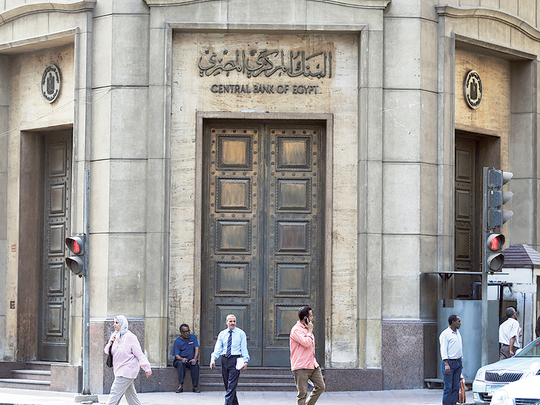
New York: Here’s another sign investors are growing more bullish on Egypt, which has interest rates of about 15 per cent and a fresh loan from the International Monetary Fund under its belt: Citigroup Inc. is selling the first structured notes tied to the nation’s sovereign debt in six years.
The New-York based bank plans to issue 305 million Egyptian pounds (Dh63.91 million; $17.4 million) of one-year securities tied to the Arab Republic of Egypt on November 25, according to data compiled by Bloomberg. The zero-coupon notes will be sold at about 85 per cent of face value. It plans to sell a further 273 million Egyptian pounds of one-year notes on December 2. Egypt’s central bank adopted a free-floating currency earlier this month and raised its benchmark rate to 14.75 per cent to contain inflation.
After five years of political turmoil which saw two presidents ousted, Egypt secured a $12 billion IMF loan earlier this month. Equities have surged since the nation scrapped controls of its pound on Nov. 3, prompting the currency to fall almost 50 per cent within a week but also eliminating the devaluation risk that previously kept foreign money managers away. Finance Minister Amr El-Garhy said this week that he will seek to raise as much as $6 billion from international bond sales through 2017.
“Investors view Egypt as an upside story,” said Elbek Muslimov, head of emerging market credit trading for central and eastern Europe, Middle East & Africa at Citigroup in London. “We have seen the re-emergence of demand for fixed income in Egypt. Pre-devaluation the currency was in disequilibrium making investors cautious.”
By devaluing Egypt joins Kazakhstan and Nigeria, in providing investors more comfort to invest with a lower risk of their capital being wiped out from currency swings. Sri Lanka also saw an influx of money into equities and structured notes after getting the green light for an IMF loan in April. Since Egypt floated the pound, London-based investor GAM UK Ltd. has also returned to the most populous Arab nation, buying $5.4 billion of treasuries after an eight-year hiatus.
“This might be a turning point for Egypt,” said Bilal Khan, senior economist for Middle East, North Africa and Pakistan at Standard Chartered Plc in Karachi. “Currency depreciation, subsidy cuts and rationalisation of energy prices as well as approval from the IMF have come together for investors to look at Egyptian bonds with renewed enthusiasm.”












